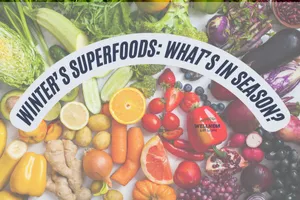FREE Meal Prep Guide: 20 Client-Favorite, Easy Recipes Inside
LEARN WITH
ALISON WILLS
Discover the tools, insights, and support to transform your life and embrace your fullest potential.

Winter’s Superfoods: What’s in Season?
Great Produce to Use in the Heart of Winter
Winter may not bring the same abundance of fresh fruits and vegetables as summer, but there’s still plenty of nutrient-rich, delicious produce available to brighten up cold days. Seasonal winter produce not only tastes great but also provides the vitamins and minerals needed to support immune health, energy levels, and overall well-being.
Here’s a look at some of the best winter produce to incorporate into your meals, along with easy ways to enjoy them.
1. Citrus Fruits: A Burst of Vitamin C
Best picks: Oranges, grapefruit, tangerines, lemons, and limes
Why they’re great:
Rich in vitamin C to boost immunity
High in antioxidants that combat inflammation
Naturally hydrating and refreshing
How to enjoy:
Add orange slices to salads for a pop of sweetness.
Squeeze fresh lemon or lime over roasted vegetables or grilled fish.
Make a warm citrus tea by steeping orange peels in hot water with ginger and honey.
2. Root Vegetables: Comforting & Satisfying
Best picks: Carrots, parsnips, sweet potatoes, turnips, and beets
Why they’re great:
Packed with fiber for digestion and gut health
A good source of complex carbohydrates for steady energy
Naturally sweet when roasted, making them perfect for hearty meals
How to enjoy:
Roast a mix of root veggies with olive oil, garlic, and rosemary.
Blend cooked carrots or sweet potatoes into a creamy soup.
Shred beets and carrots for a colorful winter slaw.
3. Cruciferous Vegetables: Detox & Gut Health
Best picks: Brussels sprouts, cabbage, kale, cauliflower, and broccoli
Why they’re great:
High in fiber and antioxidants that support detoxification
A great source of vitamin K and folate for brain health
Naturally low in calories but rich in nutrients
How to enjoy:
Sauté Brussels sprouts with balsamic glaze and pecans.
Add shredded cabbage to stir-fries or tacos.
Roast cauliflower and toss with tahini and lemon.
4. Winter Squash: Sweet & Hearty
Best picks: Butternut squash, acorn squash, kabocha squash, and spaghetti squash
Why they’re great:
Rich in beta-carotene, which supports vision and skin health
A great source of complex carbs and fiber for lasting fullness
Naturally sweet, making them a healthy comfort food option
How to enjoy:
Roast butternut squash cubes and toss with quinoa and feta.
Use spaghetti squash as a low-carb alternative to pasta.
Blend acorn squash into a creamy winter soup.
5. Dark Leafy Greens: Winter’s Superfoods
Best picks: Spinach, Swiss chard, collard greens, and mustard greens
Why they’re great:
Loaded with iron, magnesium, and folate for energy and cell repair
Rich in antioxidants that fight inflammation
Support gut health with high fiber content
How to enjoy:
Sauté Swiss chard with garlic and olive oil as a simple side.
Add spinach to soups and stews for extra nutrients.
Use collard greens as a wrap for sandwiches or tacos.
6. Pomegranates: A Superfruit for Winter
Why they’re great:
Packed with antioxidants that support heart health
High in fiber for digestion
Adds a pop of color and crunch to meals
How to enjoy:
Sprinkle pomegranate seeds over yogurt or oatmeal.
Add them to winter salads with nuts and goat cheese.
Use pomegranate juice as a base for a homemade vinaigrette.
7. Mushrooms: A Savory Winter Essential
Best picks: Cremini, shiitake, portobello, and maitake mushrooms
Why they’re great:
Rich in immune-boosting compounds like beta-glucans
A great source of plant-based protein and vitamin D
Add umami flavor to winter dishes
How to enjoy:
Sauté mushrooms with garlic and thyme for a hearty topping.
Add them to risottos and soups for extra depth.
Use portobello mushrooms as a meat alternative in burgers.
8. Apples & Pears: Crisp & Nutritious
Why they’re great:
High in fiber to support digestion
Naturally sweet and satisfying
Great for snacking or adding to recipes
How to enjoy:
Slice apples and dip them in almond butter.
Bake pears with cinnamon for a healthy dessert.
Add chopped apples to winter salads or oatmeal.
Final Thoughts
Eating seasonally in winter doesn’t mean sacrificing variety or flavor! By incorporating these winter-friendly fruits and vegetables into your meals, you’ll get more nutrients, better immune support, and comforting, delicious dishes that help you thrive in colder months.
What’s your favorite winter produce? Let me know in the comments!

Copyright © 2026 - Wellness with Wisdom
